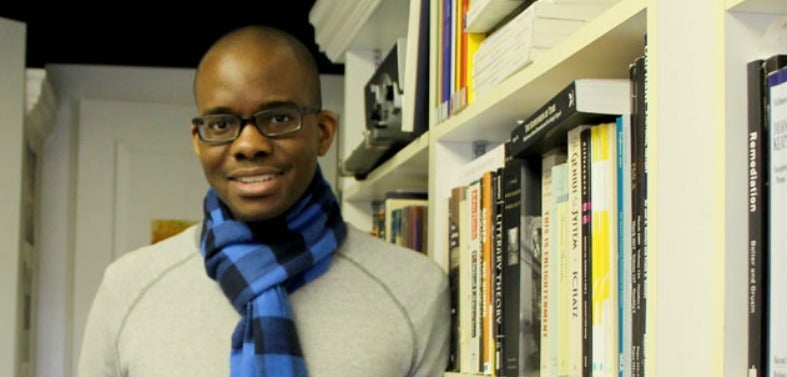Title: Caine Prize for African Writing Winner in Residence at Georgetown
Nigerian-American writer Tope Folarin, winner of the 2013 Caine Prize for African Writing, is in residence on campus through March 5.

Tope Folarin, the 2013 Caine Prize for African Writing winner, built his literary career up from a single short story and has been sharing his experience with Georgetown students as a writer-in-residence since early last month.
Now working on a novel that includes the story, he’s on campus through March 5 to give talks to the university’s literary community and engage students through writing sessions and office hours.
The university offers a residency through the university’s Lannan Center of Poetics and Social Practice to Caine Prize winners each year.
Folarin is the recipient of writing fellowships from the Institute for Policy Studies and Callaloo, and serves on the board of the Hurston/Wright Foundation. He was educated at Morehouse College and the University of Oxford, where he earned two master’s degrees as a Rhodes scholar.
Spiritual autobiography
His first short story, called “Miracle,” was set in Texas in an evangelical Nigerian church where people have gathered to hear the so-called healing powers of a blind prophet and how a young boy comes to believe in miracles.
While living in D.C., Folarin met Nigerian novelist Helon Habila, who had won the Caine Prize in 2001, and showed him the story published in Transition, a literary magazine at the University of Indiana.
Habila suggested he submit the story for the Caine Prize, known as the leading award for African literature, and the story won.
Folarin describes the winning piece as a “spiritual autobiography.”
“I certainly have an experience in these kinds of churches, but the particular experience I write about in the story isn’t an autobiographical one,” Folarin explains. “[The prophet] provides [the congregation] with hope, a sense of community, and let’s them know the people back home love them. I wanted to tell that story because I grew up in that situation.”
leveraging contacts
“It’s amazing that this time last year, I had one story in print, and now this year, I’m a part of this amazing tradition of writers who have emerged from this process,” Folarin says.
Since he began the residency last month, Folarin has focused on talking to students about the importance of leveraging contacts in the literary world.
“You have a number of literary heavyweights here [in the D.C. Metro region],” Folarin adds, naming award-winning writers such as Edward P. Jones, George Pelecanos, E. Ethelbert Miller and others. “I knew that if I could convince any of them or somehow show them that I was serious about [writing] that they would make themselves available, and that actually has happened.”
outstanding writer
The Caine Prize has been awarded for the past 13 years to an outstanding African writer, who receives more than $13,000 as well as the residency at Georgetown.
The prize is named in memory of the late Sir Michael Caine, who served as chair of the Booker Prize management committee for nearly 25 years. The first prize was awarded in 2000 at the Zimbabwe International Book Fair.
Since being named the 2013 winner this past July, Folarin has given readings, literary talks and lectures around the world.
Incredibly Accomplished
Each year, a member of Georgetown’s English faculty serves on the jury awarding the Caine Prize.
Nathan Hensley, assistant professor of English in Georgetown College, served on the jury that awarded Folarin at Oxford University this past July and he wrote about his experience in a blog.
“It’s thrilling to have him here at Georgetown,” Hensley says. “The students have reacted to him with great energy. He’s incredibly accomplished and incredibly dynamic in person.”
Folarin is the first Caine Prize winner not born in Africa. His parents immigrated to the United States from Nigeria before he was born in Utah.
“[His short story] didn’t seek to tell us about the African experience in some broader generalized sense, but rather focused on a local and particular and concrete set of human situations,” Hensley says. “The fact that it wasn’t a story that sought to bear on its shoulders any universal experience, but instead strived with great particularity this one experience … it seemed to say something broader, that African fiction is all kinds of things.”